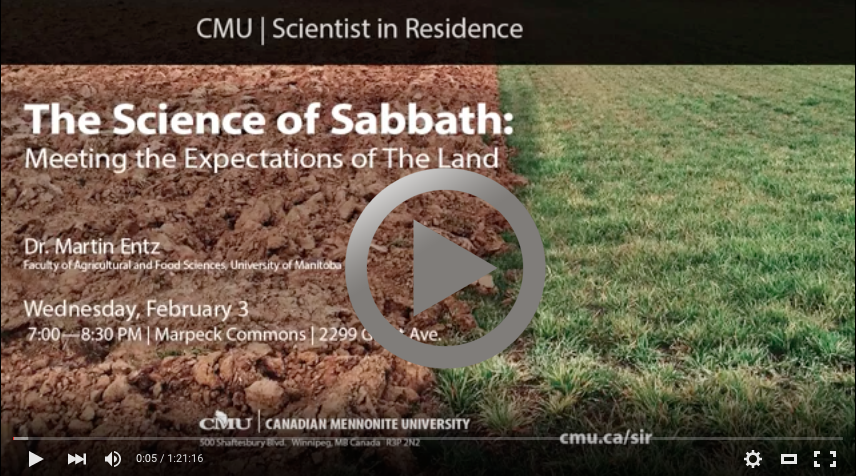Dr. Martin Entz was CMU’s 2016 Scientist in Residence during the week of February 1. Professor of Cropping Systems and Natural Systems Agriculture at the University of Manitoba, Entz leads Canada’s oldest organic versus conventional farming systems experiment and participates in ecologically-integrated farming system research and development work in Central America, southern Africa, NW China, and has volunteered with MCC in North Korea.
Video recordings of Entz’s three speaking engagements—which highlight biblical themes of stewardship to suggest a shift in emphasis from smart resource management to wonder, humility, and inspiration—are found below.
February 1 | Student Forum
Journey Into Natural Systems Agriculture
Sir Albert Howard, Rachel Carsons, Wes Jackson, and many others argue that agriculture should take a different path, one based more closely on Nature’s processes. Many research groups around the world have embraced the Natural Systems Agriculture research paradigm. Entz will share his story; his approach; what he has discovered; and how he and his research team are engaging farmers in the research process.
Because Nature’s principles can be applied at all scales—from 5000 acre grain farms to urban permaculture gardens—everyone has a chance to participate. This highlights another benefit—bringing people together in community.
February 2 | Chapel
Land as Gift: A Game Changer
When it comes to the ecological crisis we face, good guideposts are hard to find. Viewing the earth, the land, as a gift from the creator offers such as guide. Seeing the Land as a gift changes the emphasis from “smart resource management” to greater “wonder, humility, and inspiration.” Seeing the Land as a gift changes the emphasis from “scarcity” to “abundance”—thereby offering hope to an increasingly worried world.
February 3 | Public Lecture
The Science of Sabbath: Meeting the Expectations of the Land
“In the seventh year, there shall be a Sabbath of complete rest for the land, a Sabbath for the Lord.” As a scientist, Entz attempts to understand what Sabbath looks like in modern agriculture. What happens when we give up some control, when we allow the Land to be itself, when we allow it freedom from our inventiveness? Entz’s scientific work shows that sometimes less is indeed more. Serving the garden to release its own potential offers practical solutions that address both the food and the ecological crises.
Entz reflects on over 25 years of natural systems agricultural research and highlight biblical themes of stewardship to suggest a shift in emphasis from smart resource management to wonder, humility, and inspiration.

